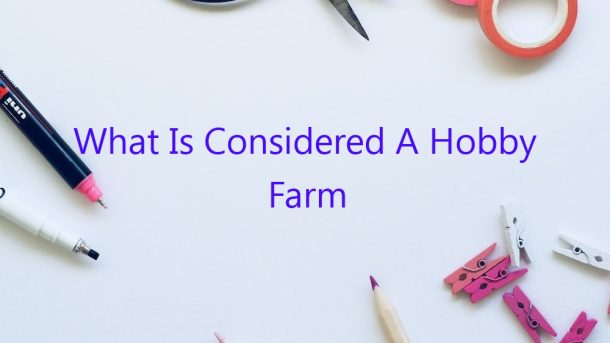A hobby farm is a small farm that is operated primarily for the enjoyment of the farmer and his or her family. Hobby farms are often smaller than commercial farms, and they may not generate a significant income. Hobby farms can be a great way to connect with the land and experience the satisfaction of producing your own food.
Hobby farms come in all shapes and sizes. Some hobby farms include a few cows, pigs, chickens, and rabbits, while others focus on growing fruits and vegetables. Many hobby farms include a variety of different animals and crops.
Hobby farms can be a great way to teach children about agriculture and the food production process. They can also help children develop a better understanding of where their food comes from.
Hobby farms can provide a valuable source of fresh produce and eggs, and they can also be a great way to get exercise and spend time outdoors. Hobby farms can also be a great way to connect with other people who are interested in agriculture and sustainable living.
If you are interested in starting a hobby farm, there are a few things you should keep in mind. First, be sure to do your research and learn as much as you can about farming. Next, be realistic about the amount of work that is involved in running a farm. Farming can be a lot of hard work, but it can also be very rewarding.
Finally, be sure to find a good location for your farm. The ideal location should have good soil, adequate water, and plenty of sunlight. It is also important to consider the climate and the prevailing winds.
If you are looking for a way to get back to the land, connect with your food, and experience the satisfaction of producing your own food, a hobby farm may be the perfect solution for you.
Contents [hide]
What makes a farm a hobby farm?
A hobby farm is a small-scale agricultural operation that is typically operated as a secondary source of income. While the definition of a hobby farm can vary, it is generally considered to be a farm that is smaller in size and scope than a traditional commercial farm.
There are a number of things that can make a farm a hobby farm. One of the most common factors is that the farm is operated on a part-time basis. This means that the farm is not the primary source of income for the owner. Hobby farms can also be classified as such based on the size of the property. A hobby farm is typically smaller in size than a traditional commercial farm.
Another key factor that can make a farm a hobby farm is the type of crops that are grown. Hobby farms typically grow a variety of crops, while commercial farms often specialize in a single crop. This is due to the fact that commercial farms are typically larger and require a greater amount of acreage in order to be profitable.
Hobby farms can also be distinguished from commercial farms based on the type of livestock that are raised. Hobby farms typically raise a small number of animals, while commercial farms often raise large numbers of animals. This is due to the fact that commercial farms are typically larger and require a greater amount of acreage in order to be profitable.
One of the biggest benefits of hobby farming is that it can be a great way to get into agriculture without making a large investment. Hobby farms typically require less acreage and fewer inputs than commercial farms. This can be a great way to learn about agriculture without making a large financial commitment.
Hobby farms can also be a great way to get into agriculture if you are interested in raising livestock. Hobby farms typically have a lower stocking density than commercial farms, which means that the animals have more space to roam. This can be a great way to get into livestock farming without making a large financial commitment.
Overall, there are a number of things that can make a farm a hobby farm. The most common factors include the size of the property, the type of crops grown, and the type of livestock raised. Hobby farms can be a great way to get into agriculture without making a large financial commitment.
What does IRS consider a hobby farm?
The Internal Revenue Service (IRS) defines a hobby farm as a farm where the primary purpose is not to make a profit. While many hobby farmers do make a profit, it is not the main goal of the farm.
Hobby farms can be a great way to enjoy the countryside and produce your own food. However, it is important to understand the tax implications of running a hobby farm. The IRS may consider your farm to be a business if you are making a profit, and you may be subject to income taxes on your farm income.
If you are not making a profit, you may be able to claim your hobby farm income on your tax return as a loss. However, you will need to meet certain criteria to do this. For example, your hobby farm must be for the primary purpose of recreation or pleasure, and not for making a profit.
It is important to discuss your farm with an accountant or tax specialist to make sure you are meeting all of the IRS requirements and taking advantage of all the tax breaks available to you.
Can you write off a hobby farm?
What is a hobby farm?
A hobby farm is a smallholding or small farm typically operated as a secondary occupation, with the focus on producing sufficient income to support the farmer and their family. Hobby farms can be operated by a single person, or a couple, and can include a wide variety of livestock and crops.
Can you write off a hobby farm?
In short, yes, you can write off a hobby farm. The Canada Revenue Agency (CRA) allows you to deduct expenses related to a hobby farm up to the amount of income you earn from the farm. This includes expenses for livestock, feed, seed, fertilizer, fuel, repairs, and other costs associated with running the farm.
How do I claim the deductions?
To claim the deductions, you will need to file a T2125 form with your income tax return. This form is used to report income and expenses from a self-employed business, including a hobby farm. You will need to provide details on the income and expenses for the farm, as well as any related capital expenses.
What are the restrictions?
There are a few restrictions to be aware of when claiming deductions for a hobby farm. First, the income and expenses must be related to the farm operations. You cannot claim personal expenses, such as the cost of your home, as deductions. Second, you are only allowed to claim expenses up to the amount of income earned from the farm. Any excess expenses cannot be carried forward to future years.
Are there any other benefits?
There are a few other benefits to owning a hobby farm. For starters, hobby farms can provide a great way to get outdoors and enjoy nature. They can also be a great way to get exercise, and to learn about agriculture and farming. Hobby farms can also provide a source of fresh produce and eggs, and can be a great way to connect with your local community.
What is the size of a hobby farm?
What is the size of a hobby farm?
A hobby farm is typically smaller than a commercial farm. They are typically defined as farms with an annual sales volume of $250,000 or less. Hobby farms can be as small as a few acres, or they can be much larger. Some hobby farms are even operated as part of a larger commercial farm.
The size of a hobby farm can vary greatly depending on the type of farming operation. Some of the factors that can affect the size of a hobby farm include the type of livestock raised, the type of crops grown, and the amount of acreage available.
Hobby farms can be a great way to get into farming, or to expand an existing farming operation. They offer a smaller scale alternative to commercial farming, and can be a great way to learn the basics of farming. Hobby farms can also provide a supplemental income, and can be a fun way to spend time outdoors.
How many acres does a hobby farm have?
A hobby farm is a small farm that is typically used for recreational purposes, such as horseback riding, fishing, or hunting. While the size of a hobby farm can vary, most hobby farms range from 10 to 150 acres.
There are a number of factors that go into determining how many acres a hobby farm has. The most important factor is the type of agricultural activity that will take place on the farm. For example, a farm that is used for grazing livestock will require more acreage than a farm that is used for growing crops.
Another factor that needs to be considered is the layout of the property. If the farm is located on a tract of land that is broken up into several different parcels, the total acreage may be less than if the farm is located on a single piece of land.
In general, a hobby farm that is used for grazing livestock and growing crops will require about 20 acres of land. However, this number can vary significantly depending on the type of livestock that is being raised and the type of crops that are being grown.
What is the difference between a hobby farm and a homestead?
Hobby farms and homesteads are both agricultural properties, but there are some key distinctions between them. A hobby farm is typically a smaller-scale farm, while a homestead is a self-sufficient property that produces most of its own food and energy.
Hobby farms are typically smaller than homesteads, and may not produce all of the food and energy they need. Hobby farms are often used for recreational purposes, such as raising animals for meat, eggs, and milk. Homesteads, on the other hand, are meant to be self-sufficient. They typically produce their own food, fuel, and electricity, and may also have their own water supply.
Homesteads are also more likely to have animals than hobby farms. Homesteaders often keep chickens, goats, and other small livestock to provide eggs, milk, and meat. Hobby farmers may also keep animals, but these are typically for recreation, not for producing food.
There are many benefits to both hobby farms and homesteads. Hobby farms can provide a great way to learn about agriculture and get back to nature. Homesteads can provide a way for people to be more self-sufficient and reduce their dependence on fossil fuels.
Which type of agricultural property is right for you depends on your needs and goals. If you are interested in learning about farming and sustainability, then a hobby farm may be the right choice for you. If you are looking for a more self-sufficient lifestyle, then a homestead may be right for you.
What is hobby income limit?
What is hobby income limit?
The hobby income limit is the amount of income that can be earned from a hobby before it is considered to be taxable income. The limit is set at $1,000 per year. This means that any income earned beyond $1,000 from a hobby is considered to be taxable income.
There are a few things to keep in mind when it comes to the hobby income limit. First, the $1,000 limit applies to each individual, not to each hobby. So, if you have multiple hobbies, the income from all of them will be combined to see if it exceeds the $1,000 limit.
Second, the $1,000 limit is for income that is earned from the hobby itself. This does not include income that is earned from the sale of products or services related to the hobby. For example, if you earn $1,000 from selling handmade crafts that you made as a hobby, that income would not be taxable. However, if you earn $1,000 from teaching a class on how to make handmade crafts, that income would be taxable.
Finally, the $1,000 limit does not apply to income that is earned from a hobby that is turned into a business. If you start making a profit from your hobby, the income from the business is considered to be taxable income.
So, if you earn more than $1,000 from your hobby in a year, you will need to report that income on your tax return. However, if you only earn a small amount of income from your hobby, you may not need to report it on your tax return. It is best to speak with a tax professional to determine if your hobby income is taxable.




